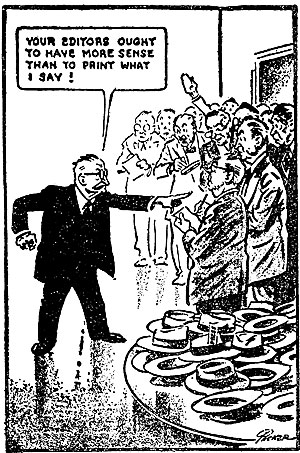 |
The Indian Embassy in Kathmandu has confirmed the authenticity of the letter Ambassador Rakesh Sood wrote to Deputy Prime Minister Sujata Koirala regarding the Machine Readable Passport (MRP) deal. A perfunctory press release from the embassy regretted that a confidential communication had been publicised, but didn't claim that the letter had been misinterpreted.
The leaked letter reads as if the ambassador is issuing a fiat to his underlings. It connects a commercial contract with the national security concerns of India and bilateral relations, and then makes an offer that the government of Nepal could hardly refuse. No wonder Madhav Nepal trembled in the parliamentary committee hearing when the opaque deal was discussed.
Strangely, the hyperactive Nepali media got hint of the controversy only when Maoist leader Narayan Kaji Shrestha read out the offending portions of the letter in parliament. The story appeared in the press after the contract had been cancelled. In addition to the limitations of the media, this episode exposes the marginality of commentators and columnists in Nepal.
Verifiability is the sine qua non of news reports, the maxim being 'when in doubt, leave it out'. Despite the antiquity of speculative reporting and instigative journalism in politics, editors and reporters try to keep away from statements involving diplomatic circles that can't be attributed to an identifiable authority.
In journalism, there is a grey zone of unverifiable facts and believable fictions where the sources and imaginations of columnists and commentators get full play. But this is a minefield where very few Nepali columnists dare to tread. Only a few will stick their neck out to pass judgement on what can't easily be substantiated; most of us in the trade are essentially dissectors of past events.
If there were a columnist of repute with access to 'usually reliable sources', the Maoist Veep would have been spared the embarrassment of owning up to privileged access to confidential documents in parliament. The contents of the letter would have appeared under a byline in a newspaper and parliamentarians could have reacted accordingly. But it seems sources in Nepal have more trust in politicians than in journalists when it comes to leaks.
Columnists in Nepal have few contacts and even less influence mainly because most of us are interlopers. Quite often, editors and reporters write columns on subjects of their interest. Specialists contribute technical pieces for a general audience. Freelancers from corporations or NGOs who write for visibility and voice. Academics, too, pontificate through the media. Predictably, politicians are most eager to be columnists as it confers the legitimacy of knowledge upon them. Owners of media houses love this cosy arrangement as it saves them from the hassle
of dealing with eccentric columnists they can't afford to support.
Most newspapers add or remove columns as they go along. Such a lack of continuity is one of the reasons columnists fail to develop contacts in the corridors of power and those in authority do not feel the need to cultivate commentators. It's much more rewarding to keep reporters, editors and publishers in good humour. But clearly, whoever leaked the confidential MRP letter to the Maoists didn't have enough faith in the media fraternity as a whole to trust it with the explosive nature of the document.
There is no reason for television and radio channels to shy away from having in-house commentators that keep an eye on the big picture by distancing themselves from the daily grind of reporting. Publishers need to invest in a corps of columnists to have an edge in the marketplace of news interpretation. When almost everybody is reporting the same thing, it's the point of view of commentators that separates the wheat from the chaff.
READ ALSO:
MRP masala, Prashant Jha, From issue #498 (16 April 2010 - 22 April 2010)



